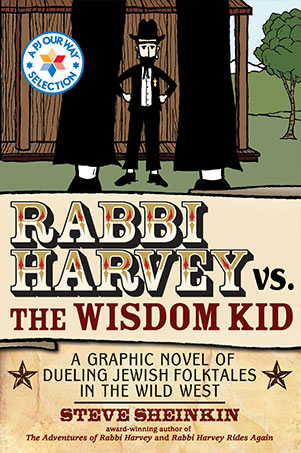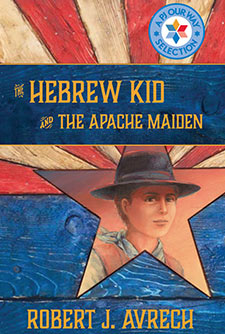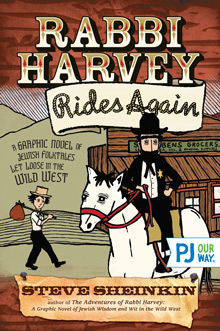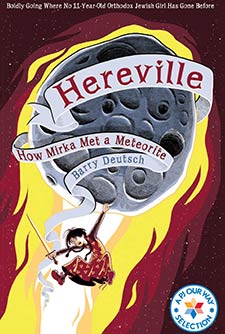Rabbi Harvey vs. the Wisdom Kid
This town’s not big enough for two Rabbis…Bad Bubbe’s darling son, Rabbi “Wisdom Kid” Ruben, is new in town, and he wants to get rid of Rabbi Harvey once and for all! See them duke it out in this Wild West battle of wits!
Average Rating
( hint: Login to leave a review! )
473 Reviews
Leave Review
What the Book is About
Jewish Content & Values
Positive Role Models
Content Advisory
Talk it Over!
More for You
What the Book is About
In this third book of the Rabbi Harvey series, Rabbi Harvey, the non-violent leader of the fictional town of Elk Spring, Colorado, is up against a whole team of bad guys! Bad Bubbe and her two sons (one of whom is also a rabbi) have a master plan to kick Rabbi Harvey out of town. “Big Milt” Wasserman and his son are also eager to see Rabbi Harvey go. Rabbi Harvey must use his wits and Jewish wisdom to save himself, his friend Abigail, and the town from ruin. This well-drawn graphic novel is an easy and enjoyable book for readers of all ages.
Jewish Content & Values
- Hafoch ba hafoch ba, de'kula ba (Aramaic; “Turn it and turn it, for everything is in it.”): This quote from Ethics of the Fathers suggests that all the wisdom of the world can be found in the Torah (the first five books of the Bible). As sheriff of Elk Spring, Rabbi Harvey uses Jewish wisdom to deliver justice, demonstrating the ageless (and practical) value of Jewish thoughts and ideas.
- The Wise Men of Chelm: Tongue-in-cheek Jewish folk tales about the wise men of Chelm come to life in the fictional town of Helms Falls.
- V’ahavta l’reacha kamocha (Hebrew; “Love your neighbor as you love yourself.”): This commandment from the Bible (Leviticus 19:18) is at the core of all that Rabbi Harvey does. Because he cares about others, Rabbi Harvey is very different from his nemesis, Rabbi “Wisdom Kid” Rubin, who only cares about himself.
- Yiddish words are used by Bad Bubbe and translated in the text.
Positive Role Models
- Rabbi Harvey is a likeable leader who is always ready to use his wit and wisdom to keep the peace.
- Abigail is a brave, quick-thinking, and loyal friend of Rabbi Harvey's. She shares his values and can hold her own against Bad Bubbe and her posse.
Content Advisory
None.
Talk it Over!
There are two rabbis in the story: Rabbi Harvey and Rabbi "Wisdom Kid" Rubin. What is similar about them? What is different? If you had a problem, which rabbi would you turn to for help? Why?
More for You
Hillel vs. Shammai: In the chapter "Harvey in Paradise," Rabbi Harvey is tied to a tree. He thinks one of his students may have done it as revenge for having to take a difficult exam about Hillel vs. Shammai. Hillel and Shammai were two 1st century BCE rabbis who were famous for debating with each other. Hillel favored more compassionate and conciliatory action, while Shammai was stricter and kept to the letter of the law. The most famous story about Hillel and Shammai concerns a man who came to each of them separately and asked to learn all of the Torah while standing on one foot. Shammai chased the man away. Hillel answered, "What is hateful to you, do not do to your neighbor: that is the whole Torah; the rest is commentary. Go and learn it." (Babylonian Talmud: Shabbat, 31A).
What the Book is About
What the Book is About
In this third book of the Rabbi Harvey series, Rabbi Harvey, the non-violent leader of the fictional town of Elk Spring, Colorado, is up against a whole team of bad guys! Bad Bubbe and her two sons (one of whom is also a rabbi) have a master plan to kick Rabbi Harvey out of town. “Big Milt” Wasserman and his son are also eager to see Rabbi Harvey go. Rabbi Harvey must use his wits and Jewish wisdom to save himself, his friend Abigail, and the town from ruin. This well-drawn graphic novel is an easy and enjoyable book for readers of all ages.
Jewish Content & Values
Jewish Content & Values
- Hafoch ba hafoch ba, de'kula ba (Aramaic; “Turn it and turn it, for everything is in it.”): This quote from Ethics of the Fathers suggests that all the wisdom of the world can be found in the Torah (the first five books of the Bible). As sheriff of Elk Spring, Rabbi Harvey uses Jewish wisdom to deliver justice, demonstrating the ageless (and practical) value of Jewish thoughts and ideas.
- The Wise Men of Chelm: Tongue-in-cheek Jewish folk tales about the wise men of Chelm come to life in the fictional town of Helms Falls.
- V’ahavta l’reacha kamocha (Hebrew; “Love your neighbor as you love yourself.”): This commandment from the Bible (Leviticus 19:18) is at the core of all that Rabbi Harvey does. Because he cares about others, Rabbi Harvey is very different from his nemesis, Rabbi “Wisdom Kid” Rubin, who only cares about himself.
- Yiddish words are used by Bad Bubbe and translated in the text.
Positive Role Models
Positive Role Models
- Rabbi Harvey is a likeable leader who is always ready to use his wit and wisdom to keep the peace.
- Abigail is a brave, quick-thinking, and loyal friend of Rabbi Harvey's. She shares his values and can hold her own against Bad Bubbe and her posse.
Content Advisory
Content Advisory
None.
Talk it Over!
Talk it Over!
There are two rabbis in the story: Rabbi Harvey and Rabbi "Wisdom Kid" Rubin. What is similar about them? What is different? If you had a problem, which rabbi would you turn to for help? Why?
More for You
More for You
Hillel vs. Shammai: In the chapter "Harvey in Paradise," Rabbi Harvey is tied to a tree. He thinks one of his students may have done it as revenge for having to take a difficult exam about Hillel vs. Shammai. Hillel and Shammai were two 1st century BCE rabbis who were famous for debating with each other. Hillel favored more compassionate and conciliatory action, while Shammai was stricter and kept to the letter of the law. The most famous story about Hillel and Shammai concerns a man who came to each of them separately and asked to learn all of the Torah while standing on one foot. Shammai chased the man away. Hillel answered, "What is hateful to you, do not do to your neighbor: that is the whole Torah; the rest is commentary. Go and learn it." (Babylonian Talmud: Shabbat, 31A).





